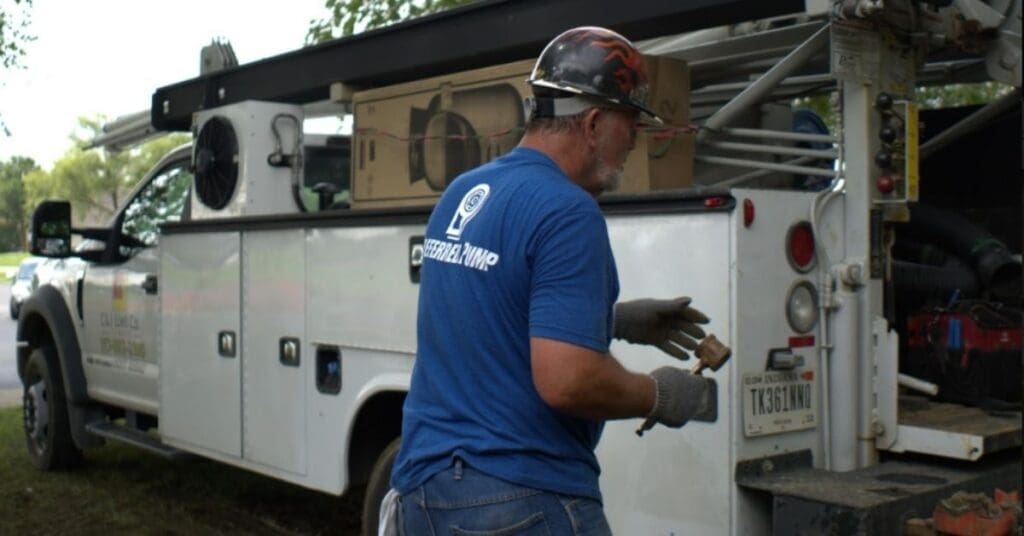What Is the Process for Having a Water Well Drilled?
You find yourself in need of a private water well, but where do you begin? Did you know that there are over 400k water wells in Indiana? As a homeowner, it’s helpful to know the process of drilling a water well and C&J would like to offer some helpful tips on how to navigate through the well-drilling process. Check out our Guide to Owning a Water Well.
Hire a Qualified Water Well Driller
When you begin this process, be sure to do your research on water well drilling contractors. Check with the state and make sure they are licensed to drill wells and install water well pumps. You will want to verify that they are insured and bonded as well. Compare the pricing structure and confirm that you are getting a fair price for the work done.
Remember, a cheaper price for water well drilling doesn’t necessarily mean a better value. “Buy the best and cry once” means you get the quality parts and equipment from the beginning and not the cheap parts that fall apart and you end up replacing it with what you should have bought in the first place. Have you ever settled for something you didn’t really want and then down the road kicked yourself for not buying the better thing you really wanted in the first place? Then did you actually end up buying the better thing? You can probably see how just going for the better option in the first place would have saved you money. If you didn’t, then you just stayed unhappy with what you settled for and that’s another cost altogether.
C&J uses premium non-corroding, stainless-steel well screens, and rust-proof fittings. We back our parts and labor with a limited 10-year warranty. At C&J Well Co, although we know our prices are generally somewhere in the industry average—not the most expensive, nor the cheapest—we believe the value we provide is second-to-none. When you partner with C&J you can trust you’re getting a team that cares enough to serve you with our very best. Combined with over 25 years of well-drilling experience, you are sure to get the best value during your well-drilling process.
Types of Water Wells
Conventional Drilled Wells
Drilled wells are constructed by percussion or rotary-drilling machines. Drilled wells can be thousands of feet deep and require the installation of the casing. Drilled wells have a lower risk of contamination due to their depth and use of continuous casing. Most residential wells are 5 inches in diameter, but the depth can vary greatly. How deep the water well needs to be will depend on many variables, such as geography, geological makeup, underground aquifers, and others.
Whether you are drilling a well for a new construction home, or a replacement well for an existing property, you can be confident that C&J uses only the best materials available to drill and case our wells, we set high standards for our water well drilling services, and value treating our customers with the utmost respect.
Bucket Wells
Bucket drilling uses a cylindrical bucket with cutting blades or teeth mounted on a hinged bottom to repeatedly cut and lift sediments from the borehole. the process is repeated as necessary to achieve the proper borehole depth. A bucket well is often recommended in areas with very little water production from underground aquifers. While they aren’t usually as deep as conventional wells, because the borehole diameter is so large, greater water storage is available. This storage creates ample production for the average family’s needs.
Water Well Components
Wellhead and Cap
C&J uses a modernized, bug-proof cap at the top of a wellhead. A secure cap fits over the wellhead to keep out debris and protect the electrical wiring that powers the pump.
Well Casing
The length of the pipe itself is called a casing. This long pipe is made of durable PVC, which doesn’t corrode like metal casings that used to be standard decades ago. Water rises into the casing up to the pump, which then transports the water into your home.
Well Pump
The pump is the most important component of the entire system. The submersible water well pump uses electricity to draw water from an underground aquifer and send it through plumbing pipes to fixtures in and around your home. C&J uses top-quality pumps and backs them with a 10-year warranty.
Well Screen
When we create a sand and gravel well, in order to prevent corrosion C&J uses the best stainless-steel well screen available. Just like the filter in your coffee pot, this screen filters out tiny bits of debris from your water source.
Gravel Pack
The stainless-steel well screen is nestled in between #4 quartz gravel. This gravel acts as a filter to keep sand from the acquirer from migrating into the stainless-steel screen, and your system.
Pitless Adapter
The primary function of the pitless adapter is to provide a junction for the drop pipe in the well to connect to the water line running to the house. This allows the wellhead to be extended above ground and grants easy access for well maintenance and service.
Pressure Tank
The pressure tank maintains the water pressure in the household and more importantly, protects the life of the water well pump. It is stored in a crawlspace, garage, basement, or mechanical room.
Pressure Grout
The bentonite slurry is pumped into the annular space between the wall of the borehole and the casing. C&J does this per state code in order to protect the water well aquifer from contaminants.
Pick the Right Water Well Pump System
If you are having a well drilled you will want to make sure you have the proper pump system. This will be based on the water production of the well, the size of your family and their needs, as well as your budget.
Conventional Pump Systems
C&J recommends Grundfos submersible pumps that offer high efficiency, high resistance to sand and other abrasives, and easy maintenance. Grundfos pumps are made of stainless steel, increasing the life and performance of the pump. We combine these premier pumps with our fiberglass pressure tanks that contain no steel, so they can’t rust.
Constant Pressure Pump Systems
Do you love the country but miss the great city water pressure? You don’t have to worry, our constant pressure systems can give you that same city water pressure right from your tap. C&J offers a high-quality pumping system using variable frequency technology. Your pump speeds up and slows down to match your demand. These systems are available for new construction or upgrade your existing system.
Plan on Water Treatment Equipment
Well water has the ability to filter naturally, but it’s still important to get it tested and treated for bacteria and other chemicals that may be present. Well water contains many natural minerals, but too much of certain minerals can be hazardous to your health. Getting your well water tested regularly by a certified water specialist will help identify typical water problems like bad taste, bad odor, and excessive iron.
C and J Water can test your water and help you choose from a wide selection of water softeners and filters to meet your specific water treatment needs. Testing for bacteria and hardness minerals will not only keep your family safe but also extend the life of your well system components. You will need to determine if you need an iron, sand, or sediment filter, odor removal unit, or even an ultraviolet light to mitigate bacteria and viruses. We also recommend a twin-tank water softener for well water. The twin unit we offer has soft water regeneration instead of pulling raw earth water to clean the resin bed—like all single tank softeners. This ability to get the resin bed thoroughly cleaned, especially of iron, makes it possible for us to provide a softener that does not need an additional iron filter. Though a twin softener is more expensive than a single tank unit, our twin cost less to buy than the typical single tank softener combined with an iron filter.
Additionally, we strongly advise a reverse osmosis drinking water system. Reverse Osmosis is a filtration system designed to remove dissolved solids, organic and inorganic forms, that a water softener cannot. RO removes metals like arsenic, aluminum, copper, lead, chromium, and many others. It also removes inorganic forms such as nitrates, phosphates, chlorides, sulfates, and more. RO works by forcing water from your home’s supply through the RO membrane. This membrane contains thousands of tiny holes, just large enough to allow water molecules to pass through. Anything bigger than a water molecule is trapped and cannot fit through the membrane.
 Know Who to Call in an Emergency
Know Who to Call in an Emergency
Over the course of your water well ownership, you might encounter a leak in your system, or wake up one morning with no water. The licensed technicians at C&J are dispatched to quickly travel to places around Central Indiana as needed, and we always give top priority to a no-water emergency. We use a 24-hour answering service, so there is no need to wait until regular business hours to contact us. If you are not out of water but need well service emergency assistance, please call us immediately and we’ll be happy to accommodate you as quickly as possible.
Plan for Preventative Maintenance
Water well preventative maintenance helps give you the peace of mind that everything is working properly. The primary and most important kind of maintenance is a well cleaning every seven years. During a water well cleaning, we remove your submersible pump out of the well, lower a high-output air line into the well, and airlift years of built-up sediment and gunk through the top of the well. This freshens up your old well and redevelops the water well screen so you get improved water flow and quality. We also recommend an annual well inspection to make sure all the well system components are in good working order.
Drilling a private water well can be a daunting task, but thankfully C&J Well Co has the experience and expertise to guide you and help you make the best decision for your needs. Contact us today for more information!


 Know Who to Call in an Emergency
Know Who to Call in an Emergency








